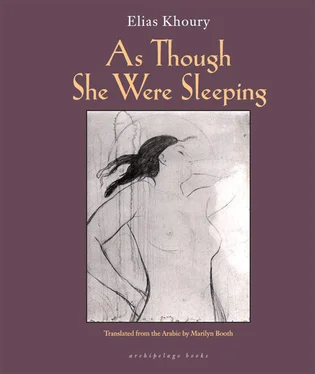Isn’t he afraid? asked Milia.
What would he be afraid of, girl?
Of the dead. Of living with the dead.
The nun couldn’t help but laugh at this clueless girl. She wanted to explain that the prophet lived with the cherubim and seraphim, but how could she make the silly girl understand that these two difficult words were types of angels or that God had let his prophet live for the Messiah’s sake so that he would find someone waiting for him at the second coming?
Don’t ask such questions, said the nun. These are matters we do not understand. It’s more important to believe than to understand. Just get to him and give your heart into his hands.
In Dahr el-Baydar Milia saw fog for the first time in her life, gauzy white clouds that spread across the heights and dipped to brush the earth. She would tell her brother Musa that the prophet’s soul made itself into a cloud that touched and surrounded her as she mounted the summit before going to him. When she set foot in Damascus and experienced its bewitching aromas and heard from the nun the story of Paul the messenger who was guided here after his conversion, she yearned to stay. The seven rivers that together are called the Barada roll into the city from every direction, sustaining it like a ship that floats over the fragrance of jasmine. The young girl walked in the nun’s shadow and went to Sidnaya, entering the grotto, a chamber lit by candles where the icons seemed to stoop and embrace each other, where sacred images mingled closely with the shadows of the human beings kneeling in silence and darkness. The nun ordered her to prostrate herself and she did. She ordered her to kiss the ancient wooden icon of the Virgin, and she kissed it. The nun told her to recite the Lord’s Prayer and she recited in a barely audible voice. The nun gripped her hand tightly and led her out into the monastery courtyard and asked her if she had seen the Lord.
The girl had no idea what she was supposed to have seen. When she entered that low-ceilinged chamber covered in icons, she assumed she had arrived at the grotto of Mar Ilyas and had now fulfilled her vow and could go home. But the nun kept the girl’s hand in hers and made her understand that the journey had only begun.
She stood before the rocky slope extending from the summit to the wadi bottom and saw God. The sky was garlanded with beautiful strands of white that looked like bird feathers; the horizon was endless and magnificent, and the grotto awaited her. Milia would remember in sharp detail how she descended the two hundred stone steps, would remember how hard she breathed as she went down, her dizziness, how the shaykh with the long beard took her hand and told her to sleep and feel no fear. But she would not remember how she climbed the same number of steps afterward. The nun said she had had to carry Milia because she ran out of breath and began coughing heavily. Milia would not remember.
At the grotto, she watched as a man unlocked the door, saying to Sister Milana that he would open the grotto only out of respect for her since Monsignor had issued an order that no one should be permitted to enter.
Go on in, said the nun.
The girl’s steps were hesitant. She was conscious of having to crouch down to enter, nearly crawling. Inside, she recognized him instantly, by the very long white beard that spread across his lower face to cover his chest. He stood facing her, his figure ringed in fire. She started to step back in terror at the live flames, and she heard the nun’s voice commanding her to stay where she was.
Sleep where he slept — lie down on your back.
Milia lies down and turns over carefully onto her back, and almost immediately she sees him turn away, striking his cloak against the rock, and go out. The rock fissures; water gushes forth and puts out the flame. Milia is in the water. A sweet cold gust of wind submerges her and the old man begins to sail upward. She reaches to grip the hem of his robe but, flying in the breeze, the robe slips from her grasp.
The old man disappears. The girl is afraid. She looks toward the door where she entered and sees that it is completely shut. The nun is nowhere to be seen.
Why did you go to sleep in there!? You were meant to pray. Mar Ilyas needed to hear your voice, yours , thanking him, once and again. That is why we allowed you inside, into the place where he slept in flight from the king. This very place is where a bird coming out of the heavens alighted to bring him food. And ya lahwi !! Instead of praying you slept.
What Milia wanted to say to the nun was that she had not slept for a moment. She wanted to tell her how she had seen the water gushing from the boulder and hundreds of birds spreading their wings to carry the old man aloft. She felt her body perfumed through and through with incense and wondered if now she belonged to another world. Yes, she had closed her eyes but not in sleep. She had closed them for the sake of truly seeing. And she did see. There was one thing she wanted to say to this prophet of flame. She wanted to become a boy — that’s what she said. She heard him grumble in despair, and he grunted that all girls wanted the same thing. But it was only because they did not know. If only humans knew — then everyone would want to be a woman. He told her about the two Maryams: the Majdaliyya and the Virgin. Every woman can become either one or the other, he told her. And only women can truly feel, and own, the two fullest emotions, love and motherhood. And — he said — both will be fully yours, Milia. Do not worry.
She asked the nun to tell her about Mary Magdalene. Sister Milana averted her face sharply as if she had not heard Milia’s question. She carried Milia up the long stone steps, panting and grumbling all the way.
What are you thinking about? Mansour asked her, and she told him the story of her visit to the grotto of Mar Ilyas in Maarrat Sidnaya. She asked him what he thought was the meaning of the words she had heard.
Mar Ilyas told you that you would become the two Maryams? he asked, incredulous.
That’s what I heard him say.
Ohhh , God help us! God save us.
From what?
From women.
I don’t understand anything, she said.
Me neither, he said.
She didn’t understand anything then or now, but here she was, half suspended on a sort of half-bed with Mansour standing beside her.
She said she saw the birds on the church rooftop and the bell that bore the weight of Mitri’s distended neck; she saw the bell and Mar Ilyas’s birds flocking around it. The birds had carried Mar Ilyas away, she told Saadeh, and the nun was wrong. She saw it, she said. Look at the icon, Mama, those are not flames, they are birds.
Where had the birds come from, filling this place with the tolling of bells?
She wanted to say that she did not like to hear bells ringing; and she did not like birds. She wanted to say she longed for some poetry. Why had Mansour stopped reciting poetry to her? She meant to say to him that she thought differently now. She adored metaphors and similes. It was better to listen to words than to be those words.
It was not her fault. He told her he was very tired and could no longer withstand it. She wanted to understand but she could not. It was Asma’s fault: Asma, widow of his dead brother, Amin. Well, no, the fault was Amin’s. No, not his; it was the mother’s fault. His mother had never, ever liked her. His mother believed that Mansour had changed and it was Milia who was to blame. The reality was completely otherwise, of course. Mansour had found Milia because he had already changed. But how could he convince his mother that her son rather than her daughter-in-law had been the agent of change? The mother was blind because she would not see. Mansour had told her that his mother was blind. You have nothing to do with it, he said. But she refuses to see that I have been on the run from her and from Amin as well. Yet Milia also saw how, since Amin’s assassination, everything had changed.
Читать дальше












